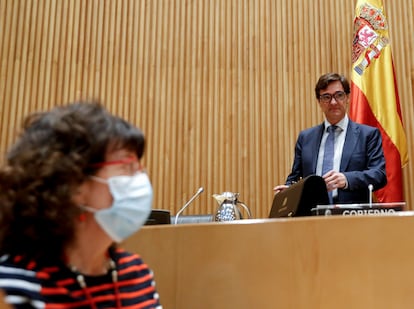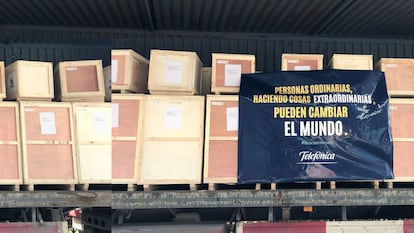Citing coronavirus crisis, Spain retreats on transparency
Requests for information regarding government procurement during the health emergency are going unanswered


The state of alarm decreed in Spain a month ago to combat the coronavirus crisis has put transparency legislation on hold. While citizens may still file requests for information, the automatic reply is that these will not be processed until the country goes back to normal.
This makes it impossible to access documents such as the meeting minutes of the expert committee that the government says it is basing its coronavirus decisions on, or a copy of the contract showing the purchase of 640,000 rapid tests from China that turned out to be defective.
It is also not possible to access data that might indicate how many tests are being conducted by each region of Spain, a figure that the Health Ministry is not revealing even though it has this information. Spain implemented a Transparency Law in 2014.
We are forced to be in confinement, but not to be left in the darkDaniel Cerdán, Canary Islands transparency official
Procurement is another opaque area. Ever since the state of alarm was declared on March 14, public agencies have stopped making new purchases save for urgently needed material such as medical equipment and protective gear. These acquisitions are going through special emergency channels designed to deal with natural disasters, allowing the government to, for instance, order road repairs without public bidding in the event of a flood.
A few regional governments such as Catalonia, and individual centers like La Paz Hospital in Madrid, are releasing information about some of their emergency purchases, including who they are buying from and how much they are paying. But the Spanish Health Ministry is keeping information about its own purchases under wraps.
The only way to obtain this kind of information right now is through the daily briefings offered by government officials. But Health Minister Salvador Illa has repeatedly avoided answering direct questions about the mysterious “Spanish distributor” used by the ministry as an intermediary to purchase the unreliable coronavirus tests that had to be returned to China. Yet information about this government contract should be public, as Illa was recently reminded by a public procurement advisory board that answers to the Finance Ministry.
In a recent report disclosed by the online daily El Confidencial, this body said that the emergency measures are no excuse to withhold information about these purchases, and that the Health Ministry is therefore violating national laws on public procurement. The ministry has not replied to questions sent by EL PAÍS.

The opacity extends to some regions, though not others. Madrid is not processing written requests for information, a regional government spokesperson has confirmed. Nor is Andalusia. But Castilla y León is. “We believe that this situation demands all possible transparency, and this right [to file requests] is an essential ingredient,” said Joaquín Meseguer, the regional chief of transparency and good governance. Unlike other regions, Castilla y León has been providing detailed, comprehensive data throughout the coronavirus crisis.
Emilio Guichot, a professor of administrative law at Seville University, adds that transparency legislation forces the Health Ministry to show how it is spending its money, and that all public contracts should be available on the government’s transparency website, Portal de Transparencia, regardless of what mechanisms were used to make the purchase.
Esperanza Zambrano, an official at the Transparency and Good Governance Council – Spain’s transparency watchdog – said that citizen requests regarding the coronavirus crisis and its management should be processed even during the state of alarm.
The way things stand, any request filed now will not be looked at until April 26 at the earliest, which is when the state of alarm officially ends (although Prime Minister Pedro Sánchez has already said he will probably ask for another 15-day extension). And the government has 30 days to reply, which means that an answer should not be expected before May or June.
It should not be the case that just when more transparency is required to create trust among citizens, there is less of itMiguel Ángel Blanes, jurist
“This date clearly does not match the immediate need for transparency required by this situation, and which is made worse by the absence of a general proactive attitude towards transparency on matters of interest,” writes Zambrano.
“It should not be the case that just when more transparency is required to create trust among citizens, there is less of it,” said Miguel Ángel Blanes, a jurist who specializes in transparency issues.
“We are forced to be in confinement, but not to be left in the dark,” said Daniel Cerdán, a transparency official with the regional government of the Canary Islands, who adds that it is “inconsistent” to withhold information while simultaneously declaring the media an essential service.
One expert consulted by this newspaper believes that transparency is not a priority right now. Vicente Álvarez, a professor of administrative law at Extremadura University, said that because of the current crisis “we are living in a different juridical moment.”
“When these measures end, it will be time to hold [authorities] to account politically, administratively and juridically,” he added. “We’re going to see millions of lawsuits.”
English version by Susana Urra.
Tu suscripción se está usando en otro dispositivo
¿Quieres añadir otro usuario a tu suscripción?
Si continúas leyendo en este dispositivo, no se podrá leer en el otro.
FlechaTu suscripción se está usando en otro dispositivo y solo puedes acceder a EL PAÍS desde un dispositivo a la vez.
Si quieres compartir tu cuenta, cambia tu suscripción a la modalidad Premium, así podrás añadir otro usuario. Cada uno accederá con su propia cuenta de email, lo que os permitirá personalizar vuestra experiencia en EL PAÍS.
¿Tienes una suscripción de empresa? Accede aquí para contratar más cuentas.
En el caso de no saber quién está usando tu cuenta, te recomendamos cambiar tu contraseña aquí.
Si decides continuar compartiendo tu cuenta, este mensaje se mostrará en tu dispositivo y en el de la otra persona que está usando tu cuenta de forma indefinida, afectando a tu experiencia de lectura. Puedes consultar aquí los términos y condiciones de la suscripción digital.








































